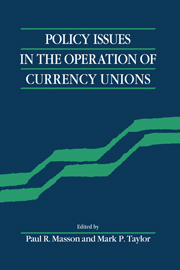Book contents
- Frontmatter
- Contents
- List of contributors
- Preface
- I Assessing the literature
- II Existing currency unions
- 2 Costs and benefits of economic and monetary union: an application to the former Soviet Union
- 3 Private capital markets and adjustment in a currency union: evidence from the United States
- 4 The economics of the CFA franc zone
- III Is Europe an optimum currency area?
- IV EMU: The road from Maastricht
- Index
4 - The economics of the CFA franc zone
from II - Existing currency unions
Published online by Cambridge University Press: 04 August 2010
- Frontmatter
- Contents
- List of contributors
- Preface
- I Assessing the literature
- II Existing currency unions
- 2 Costs and benefits of economic and monetary union: an application to the former Soviet Union
- 3 Private capital markets and adjustment in a currency union: evidence from the United States
- 4 The economics of the CFA franc zone
- III Is Europe an optimum currency area?
- IV EMU: The road from Maastricht
- Index
Summary
Introduction
The economic rationale for the existence of the CFA (Communauté Financière Africaine) franc zone in Africa is not so much that it constitutes an optimal currency area among its member countries, but rather that it provides an effective monetary standard for them. This currency union comprises seven countries that are members of the West African Monetary Union and that use a common central bank (the Central Bank for West African States) and six countries that use the Bank for Central African States as their central bank. The two banks issue distinct but equivalent currencies, each of which is known colloquially as the CFA franc. Both currencies are pegged firmly to the French franc; although the rules of the system allow each bank to change the rate independently of the other, there has not been a single parity change since 1948. Furthermore, after an early period when some countries had opted out of the system and established independent currencies, membership in the zone increased by two countries during the 1980s. Despite the diversity of economic structure across the zone, despite the massive terms-of-trade losses experienced by some member countries in the 1980s, despite the lack of intra-regional trade, thirteen sovereign countries have elected to forego the exchange rate as an instrument of external adjustment, choosing instead to moor expectations and ensure a measure of policy discipline by tying their hands – not just together, but to a well-anchored post.
Information
- Type
- Chapter
- Information
- Policy Issues in the Operation of Currency Unions , pp. 96 - 108Publisher: Cambridge University PressPrint publication year: 1993
Accessibility standard: Unknown
Why this information is here
This section outlines the accessibility features of this content - including support for screen readers, full keyboard navigation and high-contrast display options. This may not be relevant for you.Accessibility Information
- 9
- Cited by
